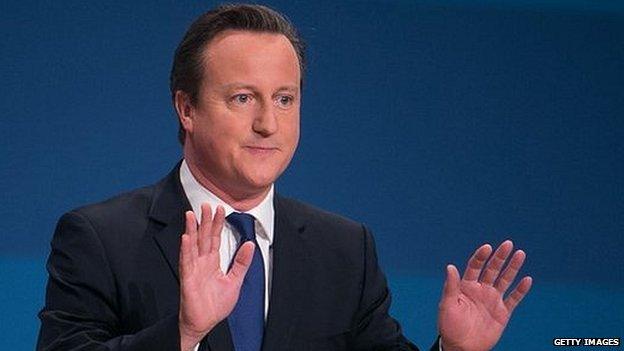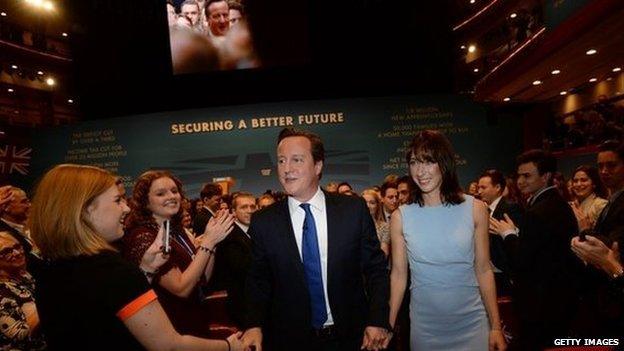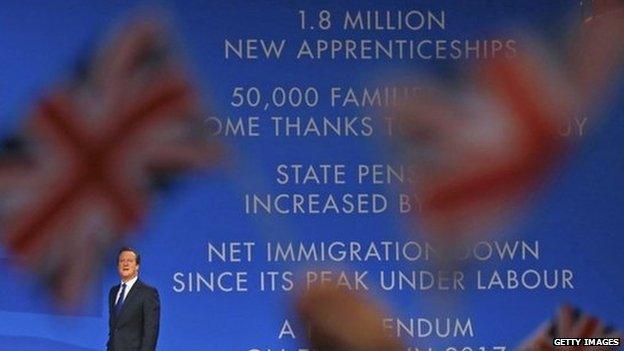Cameron frames election choice with tax cuts pledge
- Published

Mr Cameron insisted the UK was on the right track and a return to Labour would be a disaster
It was the tax cut promise a Conservative conference has waited years to hear.
Raising the 40p income tax threshold to £50,000 was a pledge that lifted the roof.
Tory candidates and canvassers have been given an easy to understand middle-class tax cut to take into the general election next May.
And this speech framed the election as a sharp choice between the Conservatives and Labour. There was barely a mention of UKIP. The central message was simple: Britain is on the right track, don't turn back.
The attack on Labour was ferocious and David Cameron tried to seize large chunks of their traditional territory. He said Labour had no right to "pontificate" about poverty after leaving a generation to "rot" on benefits.
'NHS lies'
He said nothing could be expected from a Labour government except economic disaster.
And the most powerful passage of the speech was when David Cameron accused Labour of "spreading complete and utter lies" about the Conservative Party's commitment to the NHS.

The prime minister defence of his record on the NHS was highly personal
"How dare they suggest I would ever put that at risk for other people's children? How dare they frighten those who rely on our National Health Service?" he shouted.
His son Ivan, who died in 2009 after suffering from cerebral palsy and severe epilepsy, wasn't mentioned by name but Mr Cameron's wife Samantha listened in tears.
Labour wants to put the NHS at the centre of their campaign and promised a £2.5 billion cash boost to the health service at their conference last week.
The Tories are determined to neutralise Labour's health service attack and have said NHS spending will rise in real terms through the next parliament.
Risk and hope
Whoever wins the next election, other government departments will face an even tighter squeeze.

Voters will have to wait until the end of the next Parliament for the tax cut
The speech balanced the themes of risk and hope. The risk of jeopardising a recovering economy with a return to Labour. The promise of a better Britain as austerity eases up.
"The long dark days are over," Mr Cameron said as he implored voters not to change course.
And he painted a broad policy picture in primary colours, promising simple sounding things: a good job, a decent home, more money at the end of the month, a secure retirement.
The tax cut promise was a text-book, pre-election move. Voters will have to wait for it though.
Raising the personal allowance to £12,500 and raising income tax threshold to £50,000 will happen by April 2020. That's what the Conservatives are promising.
Quiet confidence
The party claims a typical basic rate taxpayer will pay £500 less in tax than they do now while increasing the higher rate threshold to £50,000 will lift about 800,000 people out of 40% tax.
These changes are meant to outflank the Liberal Democrats and UKIP while throwing down a difficult challenge to Labour.
The Conservatives say they're unlikely to begin bringing in the two tax cuts until 2018 - the year the deficit is meant to have gone - and there is no detail on how these tax cuts will be funded.
The expected annual cost of the changes is £7.2bn and the sums will be done in future Budgets. Labour are saying these are "pie-in-the-sky" promises.
The Tories haven't won an election outright since 1992. David Cameron reassured the conference it's what he's fighting to deliver. The mood in the party is quietly confident but they know getting a majority will be very tough.
No sitting government has increased its vote share since 1955. Strategists in all parties accept the election is impossible to predict.
The Conservatives trail Labour slightly in the opinion polls but on the questions of economic competence and leadership they're ahead. This confident, podium-delivered speech will not have hurt.
"There is only one real choice: the Conservatives or Labour. Me in Downing Street, or Ed Miliband in Downing Street. That is the question next May. Do you want to go back to square one or finish what we've done?"
David Cameron's peroration will be repeated relentlessly by the Tories from now until 7 May.